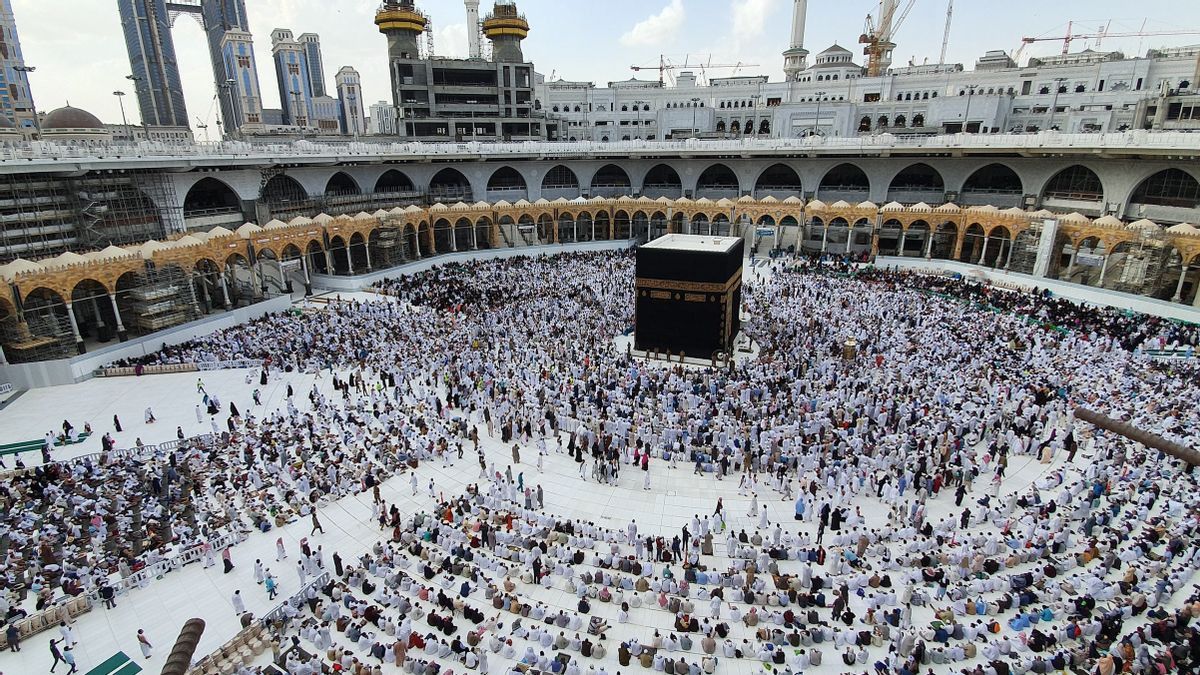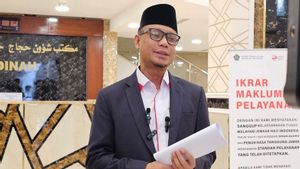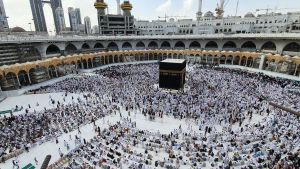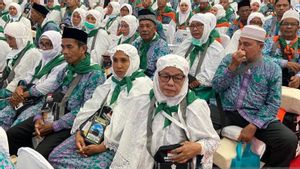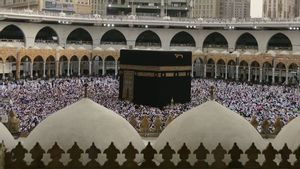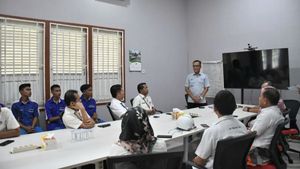JAKARTA - Additional quotas for Hajj pilgrims in 1444H/2023M have been agreed upon after obtaining approval from Commission VIII of the DPR. The commission in charge of religious affairs asked the Government to take advantage of this additional hajj quota to reduce the queue list for Hajj participants.
"This additional quota must be used optimally to reduce the list of Hajj queues in Indonesia which are quite long and long," said Deputy Chairman of Commission VIII DPR RI, Ace Hasan Syadzily, Tuesday, May 23.
For information, Commission VIII and the Ministry of Religion (Kemenag) have agreed to increase the quota of 8,000 people consisting of 7,360 regular Hajj pilgrims and 640 special Hajj pilgrims.
If the 8,000 additional quotas are accumulated with the total quota of this Hajj season, the number will be 229,000 pilgrims. This number is the highest quota record in history. Ace said the government must prioritize prospective pilgrims who canceled their departure in previous years due to the COVID-19 pandemic.
"Imagine that it has been waiting for decades and when the time left then there were problems with the rules due to yesterday's pandemic. This is very sad. Indeed, during the COVID-19 pandemic, it had to be done, but now the rules have started to return to normal," he said.
Waiting times for Hajj queues in Indonesia in each province are different. There are only 9 years of hajj queues, but there are also provinces that have reached 46 years.
In 2022, the Government of Saudi Arabia will impose a limit on the age of pilgrims under 65 years old to minimize the transmission of COVID-19. As a result, many prospective pilgrims had to be temporarily delayed to fulfill the fifth Islamic harmony.
However, this year the congregation's age limit policy has been revoked so that prospective pilgrims over the age of 65 will depart according to the departure portion number. Commission VIII of the DPR has asked the Ministry of Religion to prioritize the addition of this year's hajj quota for elderly pilgrims (elderly) and elderly companions.
Many prospective pilgrims yesterday failed to leave during the pandemic due to age rules. They have been waiting for years, so it should be prioritized," explained Ace.
For information, there are indeed many elderly people who are quite old on this year's Indonesian Hajj list. Like Rustam, a man from Blitar who is almost 100 years old but still excited when he finds out that he will go to the Holy Land.
Ace said the addition of the hajj quota must be accompanied by an increase in services for the congregation.
"Especially if what is prioritized is elderly pilgrims who need special services. There must be education to the elderly in detail, including the question of new rules in Saudi Arabia," he explained.
"The Ministry of Religion must also increase the number of officers serving pilgrims, especially health workers, especially if these 8,000 quotas are intended for the elderly," Ace added.
اقرأ أيضا:
The legislator from the West Java II electoral district also highlighted a number of things that still need attention in the future. Including, said Ace, regarding the cost of Hajj.
"Regarding the use of an additional quota of 8,000 pilgrims for this regular congregation, it certainly has consequences for additional costs," he said.
Ace said that further discussions were needed regarding the budget for the Hajj Implementation Fee (BPIH) if additional quotas were used for regular Hajj. Especially the budget derived from the value of benefits managed by the Hajj Financial Management Agency (BPKH).
"Because the cost of regular Hajj is approximately 45 percent, the cost is'subsidized' from hajj management funds," said Ace.
Commission VIII of the DPR itself has received a proposed regular additional quota fee from BPKH. The Ministry of Religion proposed additional BPIH sourced from the value of Hajj financial benefits of Rp. 288 billion for 7,360 members of the congregation.
For this reason, the DPR will hold further work meetings with the Ministry of Religion and relevant stakeholders to continue the discussion. Ace said there needed to be a more detailed explanation regarding this matter.
"We will first invite BPKH to ensure the availability of a budget for the value of benefits for additional quotas," he said.
Ace also encouraged the Ministry of Religion to proactively visit pilgrims who have the opportunity to perform the pilgrimage with this additional quota. Because there are also prospective pilgrims who feel too heavy to pay off BPIH in a short time.
One of them is like the husband and wife (couple) from Kuningan Regency who chose to postpone going to the Holy Land this year. The couple who are included in the list of prospective reserve hajj pilgrims (calhaj) cannot afford to pay off BPIH.
Actually, the couple is scheduled to leave in 2021, but due to the COVID-19 pandemic, the departure schedule has been postponed. Then due to the declining financial condition, the couple was unable to pay the increased Hajj costs, especially since the time span given for payment was only 15 days.
"We will discuss problems like this with friends from the Ministry of Religion," said Ace.
Today, Commission VIII of the DPR RI will hold a working meeting with the Minister of Religion (Menag) Yaqut Cholil Qoumas with the agenda of determining the BPIH agenda for the addition of the 2023 hajj quota. Ace said Commission VIII of the DPR would also ask the Government to optimize preparations for organizing the Hajj as best as possible, including technical matters.
"We hope that the existing technical problems will be resolved soon so that the hajj quota can be fully absorbed," he said.
The first batch of Hajj 2023 will depart on May 24, 2023, but there are still pilgrims who have not received a suitcase. Several other issues that need attention are related to visa issues, meningitis vaccine rules, to extreme weather in Saudi Arabia.
The Ministry of Religion must continue to coordinate with the relevant ministries, especially the Ministry of Health to prepare services for pilgrims experiencing health problems, such as pilgrims who have to wash their blood regularly. And extreme weather in Saudi Arabia also needs to be anticipated," said Ace.
The English, Chinese, Japanese, Arabic, and French versions are automatically generated by the AI. So there may still be inaccuracies in translating, please always see Indonesian as our main language. (system supported by DigitalSiber.id)
